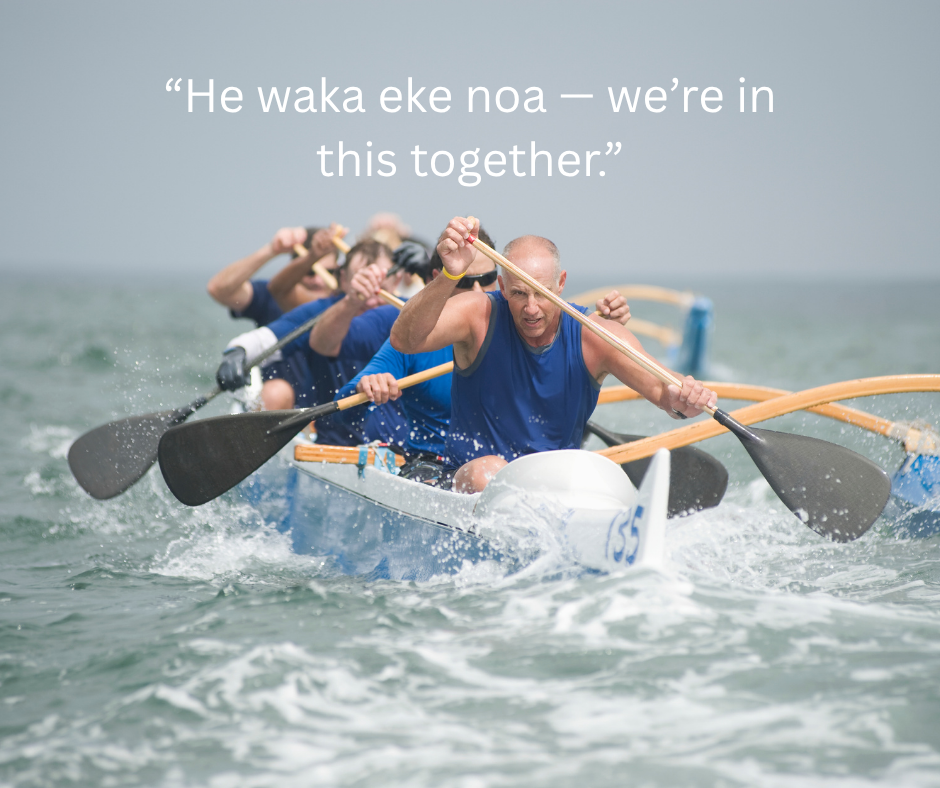
Ephesians 4:11–16
Now these are the gifts Christ gave to the church: the apostles, the prophets, the evangelists, and the pastors and teachers. Their responsibility is to equip God’s people to do his work and build up the church, the body of Christ. This will continue until we all come to such unity in our faith and knowledge of God’s Son that we will be mature in the Lord, measuring up to the full and complete standard of Christ.
Then we will no longer be immature like children. We won’t be tossed and blown about by every wind of new teaching. We will not be influenced when people try to trick us with lies so clever they sound like the truth. Instead, we will speak the truth in love, growing in every way more and more like Christ, who is the head of his body, the church. He makes the whole body fit together perfectly. As each part does its own special work, it helps the other parts grow, so that the whole body is healthy and growing and full of love.
“He Waka Eke Noa: Why You Can’t Follow Jesus Alone”
There’s a phrase many believers have spoken, whispered, or at least quietly thought:
“I love Jesus, but I can’t stand the church.”
It’s a common sentiment — sometimes born from hurt, sometimes from frustration, and sometimes simply from the messiness of life lived alongside other imperfect people. But Pastor Ross reminded us this week that while the feeling may be familiar, the idea itself stands in opposition to the heart of Scripture and the work of Christ.
Because the truth is this: You cannot love the Head while rejecting His Body. And the church is His Body.
The Table That Confronts Us
Communion — the table of the Lord — confronts the “Jesus yes, church no” mindset.
The bread and cup not only declare the sacrifice of Christ; they declare the unity that sacrifice created.
Paul writes in Ephesians 4:3 that we must “make every effort to keep the unity of the Spirit.”
Notice that: we don’t create unity. We keep what Christ already created through His body and blood.
Every time we hold the bread and cup, Jesus asks us two questions:
Do you remember what I did for you?
Do you remember who I made you?
We are not solo believers. We are one body — joined, connected, dependent, and responsible for one another.
The Beauty and Burden of the Body
Ephesians 4:11–16 paints a stunning picture of the church:
Christ gives gifts to His people
Each person contributes something essential
The body grows as each part does its work
The whole church becomes “healthy and full of love”
It’s beautiful — but it’s also deeply challenging.
Because each part doing its work means:
Loving the broken
Carrying the weak
Encouraging the discouraged
Serving when we don’t feel like it
Showing up even when we’re hurting
And allowing ourselves to be carried when we’re struggling
That’s why Ross said the times we feel we least like being among the people of God are often the times we most need to be there.
“When One Part Suffers…”
Ross shared that someone came to him last Sunday feeling low — worn out, deeply discouraged. And he said to them, “Then you’re in the best place.” Why? Because the body surrounds its hurting members.
Paul writes in 1 Corinthians 12:26:
“If one part suffers, every part suffers with it.”
This is not theory. It’s the lived reality of the church when it functions as it should: Arms around shoulders. Prayers whispered through tears. Meals delivered. Hands held. Burden shared. Love extended.
Just like the images we all remember from the Christchurch earthquake — strangers helping strangers, lifting, pulling, rescuing — the church is meant to move toward the wounded, not away from them.
When you’re weak, the body carries you. When someone else is weak, you carry them.
He Waka Eke Noa — We’re All in This Together
Ross used a powerful Māori whakataukī:
“He waka eke noa.” We are all in the waka together.
And isn’t that the perfect picture of the church?
Some paddle strong.
Some barely keep the paddle in the water.
Some are learning.
Some are exhausted.
Some are broken.
Some are carrying wounds no one sees.
Some are leading.
Some are following.
But none are unnecessary. None are unimportant. None are alone. And the best part?
Jesus is at the bow, steering the waka. He directs the movement. He sets the pace. He charts the course. He holds us together.
Unity: A Gift Purchased at a Cost
Unity isn’t a cliché. Unity isn’t a church slogan. Unity isn’t optional. Unity was purchased by the body and blood of Jesus Christ. The cross was the cost. That’s why, when we take communion, we’re not just remembering Christ’s sacrifice — we’re renewing our commitment to His people.
We are His body because of His body.
A Simple, Life-Shaping Question
As Ross asked at the end of the message,
What does this mean for you this week?
Who needs your encouragement?
Who needs your prayer?
Who needs your presence?
Who needs you to paddle beside them?
And — equally important — Are you willing to let others carry you when you can’t?
Because that’s what the body does. That’s what unity looks like. That’s what Christ created.
He waka eke noa — we’re in this together.
